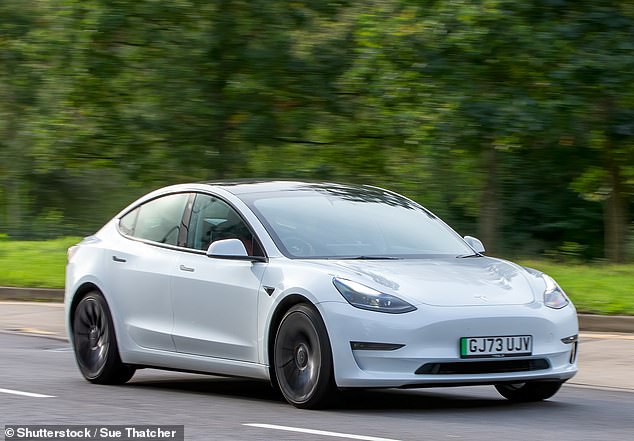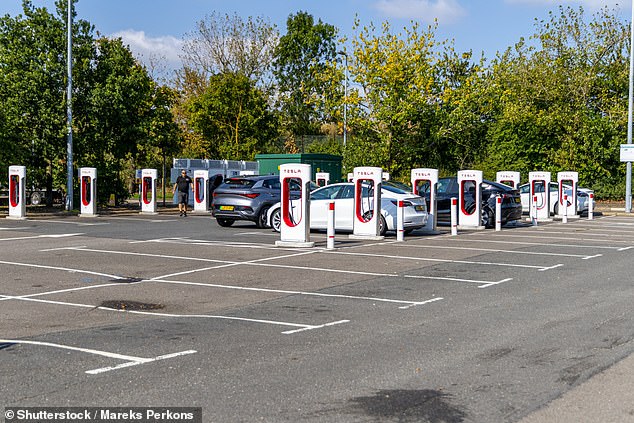More than one in 20 car miles driven in the UK is by an electric vehicle and only owners of diesel models cover higher average annual mileage than those with EVs, according to new analysis.
Motoring research charity the RAC Foundation has found that battery powered vehicles were responsible for 5.3 per cent of all recorded car mileage last year.
That is despite EVs making up just 3.8 per cent of the national car parc.
Last year, pure battery electric cars under three years old were driven an average of 10,054 miles, the study found.
This is far more than petrol models (7,585 miles) and only marginally short of the average for diesel cars, which last year was 10,728 miles.
The last year petrol cars were recorded to have higher average annual mileage than EVs was back in 2015 when battery vehicles were very much in their infancy.
The RAC says EVs are now so developed and capable that they are becoming a serious option for long-distance business drivers and ‘starting to take over where the diesel left off’.

More than one in 20 car miles driven in the UK is by an electric vehicle and only owners of diesel models cover higher annual mileage than those with EVs, according to new analysis
The calculations are based on an analysis of more than 1.2 million MOT tests, with record held by the DVLA.
Steve Gooding, director of the RAC Foundation, said: ‘Until recently, new car buyers, often fleets and businesses, have looked to diesels when they’ve needed something capable of racking up the big miles whilst still offering reasonable fuel economy.
‘Now it seems that fully electric cars are starting to take over where the diesel left off, providing a practical alternative in terms of range and cost per mile, and because of the attractive tax breaks they come with.’
The high-mileage capability of EVs has been improved by a rapidly growing charging network, especially the increase in availability of ultra-rapid charging hubs on the motorway network.
Devices located at dedicated charging sites at motorway services can boost the batteries in the latest EVs from 10 to 80 per cent charge in under half an hour.
‘The world where many saw the electric vehicle as being a second-car option, handy only for short trips, is changing rapidly to one where the battery-electric car is being bought to be a workhorse,’ Gooding said.

The high-mileage capability of EVs has been improved by a rapidly growing charging network, especially the increase in availability of ultra-rapid charging hubs on the motorway network
| Year | Petrol | Diesel | Plug-in hybrid | Electric | Average for all fuel types |
|---|---|---|---|---|---|
| 2024 | 7,585 | 10,728 | 9,367 | 10,054 | 8,460 |
| 2023 | 7,005 | 9,903 | 8,943 | 9,032 | 7,740 |
| 2022 | 6,496 | 9,635 | 9,202 | 8,588 | 7,372 |
| 2021 | 6,603 | 9,934 | 9,768 | 8,207 | 7,475 |
| 2020 | 6,994 | 10,982 | 10,626 | 9,035 | 8,066 |
| 2019 | 7,170 | 11,451 | 11,608 | 8,868 | 8,413 |
| 2018 | 7,175 | 11,577 | 11,497 | 7,856 | 8,665 |
| 2017 | 7,204 | 11,690 | 11,477 | 7,425 | 9,147 |
| 2016 | 7,286 | 11,795 | 11,057 | 7,350 | 9,477 |
| 2015 | 7,267 | 12,107 | 11,257 | 5,966 | 9,648 |
| Source: RAC Foundation analysis of MOT data provided by DVLA | |||||
Earlier this week, the Government announced that drivers buying a new electric car will be eligible for grants of up to £3,750.
Only EVs with a retail price below £37,000 – and that are sustainably produced – are eligible for subsidies, with funding for the Electric Car Grant in place until 2028-29.
However, the qualify for the scheme, manufacturers must first prove that their EVs are sustainably produced – both the cars themselves and their batteries.
This will determine the size of the discount provided from taxpayer funding, which ranges from just £1,500 up to the full quota of £3,750 for the greenest-made electric models.
However, manufacturers who fail to meet the sustainability criteria will be refused grants towards the sale price of their cars entirely.
While car makers have widely welcomed the announcement and the potential increase in public demand for new EVs the scheme will trigger, industry insiders have dubbed it a drain on public finances.













